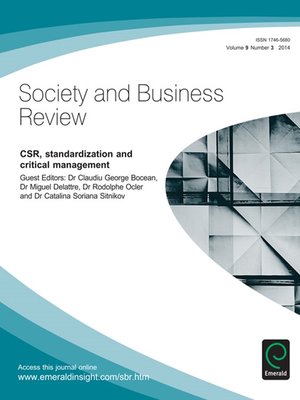Society and Business Review, Volume 9, Issue 3
ebook ∣ Society and Business Review
By Claudiu George Bocean

Sign up to save your library
With an OverDrive account, you can save your favorite libraries for at-a-glance information about availability. Find out more about OverDrive accounts.
Find this title in Libby, the library reading app by OverDrive.



Search for a digital library with this title
Title found at these libraries:
| Library Name | Distance |
|---|---|
| Loading... |
This special issue explores the relationship among CSR, standardisation and critical management and is composed of 5 papers.
In "Can CSR be Standardized Through Integrative Socio-economic Management ?", Henri Savall, Véronique Zardet, Michel Péron and Marc Bonnet examine the importance of debates on the integration of CSR norms and economic standards. They have identified phenomena and dysfunctions that alter and disturb economic and social game rules, describe their characteristics and impacts on firms, provide another tentative concept of global sustainable performance for corporate audit and decision making and study the feasibility and competitiveness of pro-active strategies to integrate standards both at the corporate level and institutional level. They proposed to apply a measurement methods combining qualitative, quantitative and financial performance metrics as opposed to the extent fragmented approach by silos which separate social norms and economic performance in order to reach sustainability.
Paolo Rossi in" the Rubik's Cube of social accountability: an institutional analysis of the standardization of Italian(ized) social reporting guidelines" explores analogies and differences across Italian (and Italianized) social reporting guidelines. The goal of this analysis is to catch whether different guidelines are moving towards uniformity and standardization or, alternatively, guidelines still embody and convey different motives and representations of social accountability processes. The standardization of social reporting guidelines in Italy, observed through the lens of reporting guidelines, has followed two tracks:
Eric Davoine and Delphine Gendre explore the difficulties encountered by a multinational SME during the implementation of SA 8000 standards by focusing on the interactions of the main actors. They used cognitive maps to follow and compare the representations of two key actors of a Swiss SME in the textile sector that had obtained a SA 8000 certification: the owner-manager and the certification manager. The identified difficulties belong to two groups: on one hand the difficulties linked to the universal aspect of the standard and to the adaptation to customs and local contingencies, and on the other hand, the difficulties linked to the manager's strategic vision and representations of social responsibility. The authors highlight the need to choose the correct pace for implementation as too strict and too quick adaptation process of practices to standards would probably lead to rebellions, clandestine and deviant practices
In "Dynamic Capabilities for CSR Management: Towards Identifying Common Processes", Quile He, Qiang Wu and Yanqing Duang examine the underlying organizational capabilities and processes involved in CSR management. The authors developed a theoretical framework to illustrate how dynamic capabilities for CSR management potentially enable firms to follow certain managerial processes to sense and seize sustainable development opportunities. This framework stresses the interrelatedness of scanning, sensing and reconfiguration capabilities in responding to stakeholder CSR requirements and mobilizing firms' internal resources to simultaneously pursue economic,...







